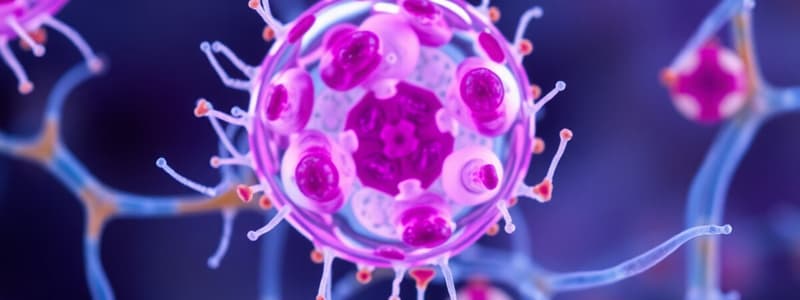Podcast
Questions and Answers
What is the basic structural and functional unit of all known living organisms?
What is the basic structural and functional unit of all known living organisms?
- Organism
- Cell (correct)
- Tissue
- Organ
Which of the following processes is crucial for reproduction in multicellular organisms?
Which of the following processes is crucial for reproduction in multicellular organisms?
- Mitosis (correct)
- Photosynthesis
- Diffusion
- Respiration
What defines genetic material in living organisms?
What defines genetic material in living organisms?
- RNA
- DNA (correct)
- Proteins
- Lipids
What mechanism drives the process of evolution by favoring organisms with advantageous traits?
What mechanism drives the process of evolution by favoring organisms with advantageous traits?
Which branch of biology focuses on the study of microorganisms?
Which branch of biology focuses on the study of microorganisms?
What is the study of genes, heredity, and variation in living organisms called?
What is the study of genes, heredity, and variation in living organisms called?
What term describes the process by which new species arise from existing ones?
What term describes the process by which new species arise from existing ones?
Which of the following structures is not found in a typical cell?
Which of the following structures is not found in a typical cell?
What is the primary focus of ecology?
What is the primary focus of ecology?
Which of the following processes is essential for ecosystem functioning?
Which of the following processes is essential for ecosystem functioning?
What does biochemistry primarily investigate?
What does biochemistry primarily investigate?
Which statement accurately describes enzymes?
Which statement accurately describes enzymes?
What is the main focus of microbiology?
What is the main focus of microbiology?
How do microorganisms influence ecosystems?
How do microorganisms influence ecosystems?
Which of the following describes physiology?
Which of the following describes physiology?
What is metabolism?
What is metabolism?
Flashcards
What is a cell?
What is a cell?
The basic structural and functional unit of all living organisms. They are responsible for carrying out essential life processes.
What is genetics?
What is genetics?
The study of genes, heredity, and variations in living organisms. It explores how traits are passed down from parents to offspring.
What is evolution?
What is evolution?
The process of change in the inherited characteristics of biological populations over successive generations. It leads to the diversity of life we see today.
What is botany?
What is botany?
Signup and view all the flashcards
What is zoology?
What is zoology?
Signup and view all the flashcards
What is speciation?
What is speciation?
Signup and view all the flashcards
What is the scientific method?
What is the scientific method?
Signup and view all the flashcards
What is natural selection?
What is natural selection?
Signup and view all the flashcards
What is a population?
What is a population?
Signup and view all the flashcards
What is Biochemistry?
What is Biochemistry?
Signup and view all the flashcards
What are Enzymes?
What are Enzymes?
Signup and view all the flashcards
What is Microbiology?
What is Microbiology?
Signup and view all the flashcards
What is Physiology?
What is Physiology?
Signup and view all the flashcards
What is Homeostasis?
What is Homeostasis?
Signup and view all the flashcards
What is Conservation Biology?
What is Conservation Biology?
Signup and view all the flashcards
Study Notes
Introduction to Biology
- Biology is the natural science studying life and living organisms, including physical structure, chemical processes, molecular interactions, physiological mechanisms, development, evolution, and distribution.
- Biology covers a wide range of topics, from molecular mechanisms to ecosystem ecology.
- Key branches include botany (plants), zoology (animals), microbiology (microorganisms), genetics, and ecology (organism-environment interactions).
- The scientific method, involving observation, hypothesis formation, experimentation, data analysis, and conclusion drawing, is fundamental to biological research.
Cell Biology
- The cell is the fundamental structural and functional unit of all known living organisms.
- Organisms are categorized as unicellular (one cell) or multicellular (many cells).
- Cells perform diverse functions including metabolism, reproduction, response to stimuli, and growth.
- Key cell structures are the nucleus, cytoplasm, cell membrane, mitochondria, ribosomes, and endoplasmic reticulum.
- Mitosis and meiosis are crucial cell processes for growth, repair, and reproduction in multicellular organisms.
Genetics
- Genetics studies genes, heredity, and variation in living organisms.
- Genes are DNA segments that hold instructions for organisms’ structure and function.
- Genes influence traits, from physical characteristics to disease susceptibility.
- DNA is the fundamental genetic material carrying hereditary information.
- Understanding genetic inheritance (Mendelian and molecular genetics) reveals how traits pass through generations.
- Genetic mutations alter DNA sequences, leading to variations and potentially diseases.
Evolution
- Evolution is the change in inherited characteristics of biological populations over generations.
- Evolution is driven by natural selection, favoring organisms with traits enhancing survival and reproduction in their environment.
- Speciation is the formation of new species from existing ones.
- Fossil records, comparative anatomy, embryology, and molecular biology are crucial evidence for evolution.
- Understanding evolutionary processes is vital for appreciating life's diversity.
Ecology
- Ecology studies the relationships between organisms and their environment.
- Key concepts include populations, communities, ecosystems, and biomes.
- Interactions like predation, competition, and symbiosis demonstrate organismal roles in environments.
- Nutrient cycles and energy flow are key ecosystem processes.
- Conservation biology applies ecological principles to protect and restore endangered species and their habitats.
Biochemistry
- Biochemistry explores chemical processes within and related to living organisms.
- Biomolecules (carbohydrates, lipids, proteins, nucleic acids) are studied for structure and function.
- Enzymes are biological catalysts accelerating biochemical reactions.
- Metabolism, the sum of all biochemical reactions, is critical for life.
- Understanding biochemistry reveals the complexity of life processes.
Microbiology
- Microbiology studies microscopic organisms (bacteria, viruses, fungi, protists).
- Microorganisms play key ecosystem roles influencing nutrient cycles and decomposition.
- Some microbes cause human and other organism diseases (pathogenic).
- Microbial communities and their functions are important subjects in medicine, biotechnology, and environmental science.
- Microscopy and culturing are fundamental techniques in microbiology.
Physiology
- Physiology examines the functions of living organisms and parts.
- It investigates how organisms maintain internal environments (homeostasis) and respond to stimuli.
- Physiological processes in various organisms share similarities.
- Examples of physiological systems include circulatory, respiratory, digestive, and nervous systems.
- Measurement and experimentation are crucial in physiological studies.
Studying That Suits You
Use AI to generate personalized quizzes and flashcards to suit your learning preferences.




